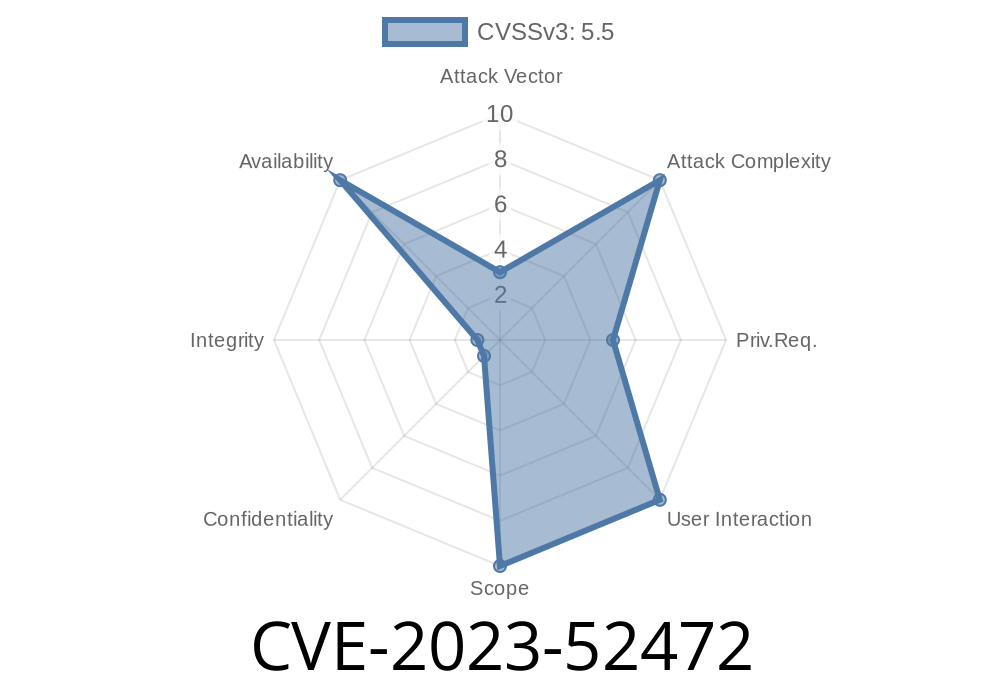In early 2024, a vulnerability was identified and patched in the Linux kernel's cryptographic subsystem, specifically within the RSA implementation. This post gives you an easy-to-follow overview of CVE-2023-52472, including what went wrong, the fix with a code example, references for more reading, and insights into real-world impact and exploitability.
What is CVE-2023-52472?
CVE-2023-52472 is a security flaw in the Linux kernel's crypto RSA code. The core issue was failure to check the return value of the memory allocation function, mpi_alloc(). If this function returned NULL due to an allocation failure and the code continued, it could cause a NULL pointer dereference—an issue that might crash the kernel or, in some rare environments, create exploitable conditions.
While on modern kernels it's nearly impossible for such a small allocation to fail in real-world scenarios, best practice (and static analysis tools) demands explicit checks to avoid future trouble.
Let's look at a simplified version of the buggy code
MPINT *mpi = mpi_alloc(256); // allocate buffer
// ... code assumes mpi is non-NULL!
mpi->len = len; // Potential crash if mpi == NULL!
Why Wasn’t This Noticed Before?
Most Linux systems would never see mpi_alloc() fail for such a small allocation; the kernel memory subsystem manages these efficiently. But static analysis tools (like Coverity or Smatch) flag any unchecked allocation as a potential bug, since underlying code might change or embed more risk in the future.
The patch is straightforward. Add a check to see if allocation succeeded before touching the pointer
MPINT *mpi = mpi_alloc(256);
if (!mpi) {
// Handle error: return, cleanup, etc.
return -ENOMEM;
}
mpi->len = len; // Safe now!
This fix ensures that in the unlikely event of allocation failure, no dereference happens, preventing a crash or potential vulnerability.
Is this bug easily exploitable?
In most modern Linux environments, no. The allocations here are tiny and highly unlikely to fail. So, practical exploitation is almost impossible. However, a malicious or fault-injection attack (think fuzzers or custom kernel modules) *could* try to force failure scenarios and see if unchecked dereference causes system issues.
Would this let attackers take over?
Unlikely. The most common effect is a kernel crash (denial of service) rather than privilege escalation or code execution.
Official Patch Commit:
- crypto: rsa - add a check for allocation failure (LKML)
NVD Entry:
- CVE-2023-52472 National Vulnerability Database
Linux Kernel Source:
- Linux Kernel crypto/mpi/mpi-mul.c
Kernel Hardening Guide:
- Linux Kernel Documentation: Security
Summary
CVE-2023-52472 represents a class of kernel bugs that are theoretically dangerous but unlikely to bite in daily life. The fix was simple—always check memory allocation!—but it's a great example of why continuous kernel care, automated static checking, and upstream code hygiene is vital for Linux reliability and security.
If you help maintain kernel code, always validate allocations—even if “it will never fail” today, some future change might prove you wrong.
Stay safe. Keep your kernel updated!
*Follow for more kernel vulnerability breakdowns and fixes in plain language!*
Timeline
Published on: 02/26/2024 16:27:48 UTC
Last modified on: 04/17/2024 18:47:08 UTC
